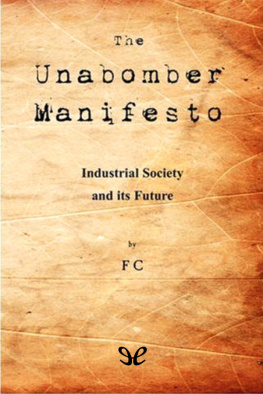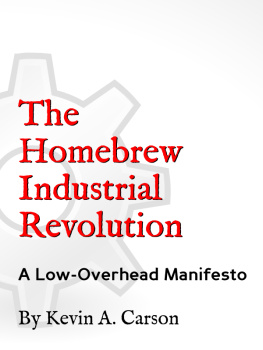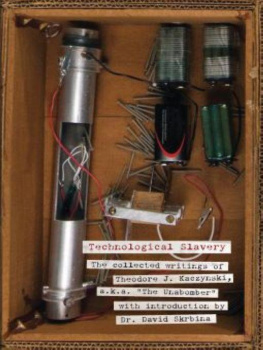Theodore Kaczynski - The Unabomber Manifesto: Industrial Society and Its Future
Here you can read online Theodore Kaczynski - The Unabomber Manifesto: Industrial Society and Its Future full text of the book (entire story) in english for free. Download pdf and epub, get meaning, cover and reviews about this ebook. genre: Politics. Description of the work, (preface) as well as reviews are available. Best literature library LitArk.com created for fans of good reading and offers a wide selection of genres:
Romance novel
Science fiction
Adventure
Detective
Science
History
Home and family
Prose
Art
Politics
Computer
Non-fiction
Religion
Business
Children
Humor
Choose a favorite category and find really read worthwhile books. Enjoy immersion in the world of imagination, feel the emotions of the characters or learn something new for yourself, make an fascinating discovery.
- Book:The Unabomber Manifesto: Industrial Society and Its Future
- Author:
- Genre:
- Rating:4 / 5
- Favourites:Add to favourites
- Your mark:
- 80
- 1
- 2
- 3
- 4
- 5
The Unabomber Manifesto: Industrial Society and Its Future: summary, description and annotation
We offer to read an annotation, description, summary or preface (depends on what the author of the book "The Unabomber Manifesto: Industrial Society and Its Future" wrote himself). If you haven't found the necessary information about the book — write in the comments, we will try to find it.
The Unabomber Manifesto: Industrial Society and Its Future — read online for free the complete book (whole text) full work
Below is the text of the book, divided by pages. System saving the place of the last page read, allows you to conveniently read the book "The Unabomber Manifesto: Industrial Society and Its Future" online for free, without having to search again every time where you left off. Put a bookmark, and you can go to the page where you finished reading at any time.
Font size:
Interval:
Bookmark:
Industrial Society and Its Future
by Theodore Kaczynski
In 1995, Kaczynski mailed several letters, some to his former victims, outlining his goals and demanding that his 35,000-word paper "Industrial Society and Its Future" (also called the "Unabomber Manifesto") be printed verbatim by a major newspaper or journal; he stated that he would then end his terrorism campaign. There was a great deal of controversy as to whether it should be done. A further letter threatening to kill more people was sent, and the United States Department of Justice recommended publication out of concern for public safety. The pamphlet was then published by The New York Times and The Washington Post on September 19, 1995, with the hope that someone would recognize the writing style. Excerpted from Industrial Society and Its Future on Wikipedia, the free encyclopedia.
Introduction
1. The Industrial Revolution and its consequences have been a disaster for the human race. They have greatly increased the life-expectancy of those of us who live in "advanced" countries, but they have destabilized society, have made life unfulfilling, have subjected human beings to indignities, have led to widespread psychological suffering (in the Third World to physical suffering as well) and have inflicted severe damage on the natural world. The continued development of technology will worsen the situation. It will certainly subject human beings to greater indignities and inflict greater damage on the natural world, it will probably lead to greater social disruption and psychological suffering, and it may lead to increased physical sufferingeven in "advanced" countries.
2. The industrial-technological system may survive or it may break down. If it survives, it may eventually achieve a low level of physical and psychological suffering, but only after passing through a long and very painful period of adjustment and only at the cost of permanently reducing human beings and many other living organisms to engineered products and mere cogs in the social machine. Furthermore, if the system survives, the consequences will be inevitable: there is no way of reforming or modifying the system so as to prevent it from depriving people of dignity and autonomy.
3. If the system breaks down the consequences will still be very painful. But the bigger the system grows the more disastrous the results of its breakdown will be, so if it is to break down it had best break down sooner rather than later.
4. We therefore advocate a revolution against the industrial system. This revolution may or may not make use of violence: it may be sudden or it may be a relatively gradual process spanning a few decades. We can't predict any of that. But we do outline in a very general way the measures that those who hate the industrial system should take in order to prepare the way for a revolution against that form of society. This is not to be a political revolution. Its object will be to overthrow not governments but the economic and technological basis of the present society.
5. In this article we give attention to only some of the negative developments that have grown out of the industrial-technological system. Other such developments we mention only briefly or ignore altogether. This does not mean that we regard these other developments as unimportant. For practical reasons we have to confine our discussion to areas that have received insufficient public attention or in which we have something new to say. For example, since there are well-developed environmental and wilderness movements, we have written very little about environmental degradation or the destruction of wild nature, even though we consider these to be highly important.
The psychology of modern leftism
6. Almost everyone will agree that we live in a deeply troubled society. One of the most widespread manifestations of the craziness of our world is leftism, so a discussion of the psychology of leftism can serve as an introduction to the discussion of the problems of modern society in general.
7. But what is leftism? During the first half of the 20th century leftism could have been practically identified with socialism. Today the movement is fragmented and it is not clear who can properly be called a leftist. When we speak of leftists in this article we have in mind mainly socialists, collectivists, "politically correct" types, feminists, gay and disability activists, animal rights activists and the like. But not everyone who is associated with one of these movements is a leftist. What we are trying to get at in discussing leftism is not so much a movement or an ideology as a psychological type, or rather a collection of related types. Thus, what we mean by "leftism" will emerge more clearly in the course of our discussion of leftist psychology. (Also, see paragraphs 227-230.)
8. Even so, our conception of leftism will remain a good deal less clear than we would wish, but there doesn't seem to be any remedy for this. All we are trying to do is indicate in a rough and approximate way the two psychological tendencies that we believe are the main driving force of modern leftism. We by no means claim to be telling the whole truth about leftist psychology. Also, our discussion is meant to apply to modern leftism only. We leave open the question of the extent to which our discussion could be applied to the leftists of the 19th and early 20th century.
9. The two psychological tendencies that underlie modern leftism we call "feelings of inferiority" and "oversocialization." Feelings of inferiority are characteristic of modern leftism as a whole, while oversocialization is characteristic only of a certain segment of modern leftism; but this segment is highly influential.
Feelings of inferiority
10. By "feelings of inferiority" we mean not only inferiority feelings in the strict sense but a whole spectrum of related traits; low self-esteem, feelings of powerlessness, depressive tendencies, defeatism, guilt, self-hatred, etc. We argue that modern leftists tend to have some such feelings (possibly more or less repressed) and that these feelings are decisive in determining the direction of modern leftism.
11. When someone interprets as derogatory almost anything that is said about him (or about groups with whom he identifies) we conclude that he has inferiority feelings or low self-esteem. This tendency is pronounced among minority rights activists, whether or not they belong to the minority groups whose rights they defend. They are hypersensitive about the words used to designate minorities and about anything that is said concerning minorities. The terms "negro," "oriental," "handicapped" or "chick" for an African, an Asian, a disabled person or a woman originally had no derogatory connotation. "Broad" and "chick" were merely the feminine equivalents of "guy," "dude" or "fellow." The negative connotations have been attached to these terms by the activists themselves. Some animal rights activists have gone so far as to reject the word "pet" and insist on its replacement by "animal companion." Leftish anthropologists go to great lengths to avoid saying anything about primitive peoples that could conceivably be interpreted as negative. They want to replace the world "primitive" by "nonliterate." They seem almost paranoid about anything that might suggest that any primitive culture is inferior to our own. (We do not mean to imply that primitive cultures are inferior to ours. We merely point out the hypersensitivity of leftish anthropologists.)
12. Those who are most sensitive about "politically incorrect" terminology are not the average black ghetto-dweller, Asian immigrant, abused woman or disabled person, but a minority of activists, many of whom do not even belong to any "oppressed" group but come from privileged strata of society. Political correctness has its stronghold among university professors, who have secure employment with comfortable salaries, and the majority of whom are heterosexual white males from middle- to upper-middle-class families.
Next pageFont size:
Interval:
Bookmark:
Similar books «The Unabomber Manifesto: Industrial Society and Its Future»
Look at similar books to The Unabomber Manifesto: Industrial Society and Its Future. We have selected literature similar in name and meaning in the hope of providing readers with more options to find new, interesting, not yet read works.
Discussion, reviews of the book The Unabomber Manifesto: Industrial Society and Its Future and just readers' own opinions. Leave your comments, write what you think about the work, its meaning or the main characters. Specify what exactly you liked and what you didn't like, and why you think so.











